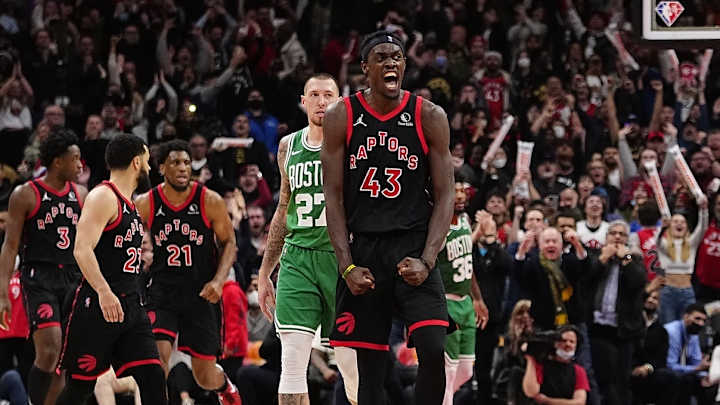Pascal Siakam's All-NBA Candidacy Will Come Down to the Question of Tradition

We’ll start with this: Tradition is never a very good reason to continue with the status quo. Frankly, when it comes to All-NBA voting, it’s not even a reason at all.
For the past 66 years, every All-NBA team has looked like a traditional basketball team. Every team has had two guards, two forwards, and a center. On paper, it’s a team that should work. It’s a team that makes sense.
But these days, the league has changed. Just look at the Toronto Raptors, the team at the forefront of the modern positionless basketball movement. What position, for example, does Scottie Barnes play?
“Point center,” Raptors coach Nick Nurse said. “No, I’m just kidding, I’m just kidding. I don’t know. … He’s played pretty much all of them. I’m not being too dramatic that he played center one night and point guard the next.”
So how would you classify Barnes for All-NBA voting? What about Nikola Jokic, the Denver Nuggets point center? Now, what happens if arguably the two best players in the league play the same ‘position’? It’s a situation the NBA and All-NBA voters are trying to navigate right now. It’s quite possible Joel Embiid, the frontrunner for the league MVP earns first-team All-NBA honors while the presumptive runner-up for the award Jokic earns second-team honors.
It's only a problem if All-NBA voting matters really matters. Take for example the curious case of Boston Celtics legend Bill Russell who has five NBA MVPs and only three first-team All-NBAs. Does it matter that he somehow was the best player in the league in 1958, 1961, and 1962 and didn’t earn first-team honors in any of those seasons? Maybe not. But today, there are millions of dollars on the line. Pascal Siakam saw the value of his max contract extension increase by 3% because he made second-team All-NBA in 2019-20.
The solution may be to just go back in time before 1955 when positions didn’t matter to All-NBA voting. Voters picked the ten best players in the league to fill the two All-NBA teams at the time and those players earned recognition.
Today, it would be the top 15 players to fill the three teams. Is there a problem if Jokic, Embiid, LeBron James, Kevin Durant, and Giannis Antetokounmpo shared first-team honors together? In a hypothetical game, would that team struggle? I think not.
“To be honest with you, if you go by position, I feel like some bigs are really good, some point guards are really good, but if you go by position you may have to take someone out,” said Chris Boucher, another one of Toronto’s forward-center hybrids.
Should we get rid of positions for All-NBA? The game has become so positionless that it seems silly these days to still have positions. What do you think?
— 𝐀𝐚𝐫𝐨𝐧 𝐑𝐨𝐬𝐞 (@AaronBenRose) March 25, 2022
Changing the rules, however, would impact Siakam who is very much in the race for one of the league’s six All-NBA forward spots. He won’t beat out James, Durant, Antetokounmpo, Jayson Tatum, or DeMar DeRozan, but he’s certainly in that next group alongside Jimmy Butler for the final of the ‘traditional’ forward spots.
But all that could change if voters decide to do something different this season and disregard tradition to ensure the league's top players earn All-NBA and first-team honors. There's no doubt Siakam is playing at an All-NBA level, but, truth be told, he's not a top 15 player in the league this season.
In the end, his candidacy may fall because of Toronto's innovation and the death of traditional basketball.
Further Reading
The Raptors see top seeds up for grabs, but injury issues are becoming apparent
Pascal Siakam shows just how far he's come in Raptors victory over Celtics
Chris Boucher explains how the worst game of his career changed his life

Aaron Rose is a Toronto-based reporter covering the Toronto Raptors since 2020. Previously, Aaron worked for the Eau Claire Leader-Telegram.
Follow AaronBenRose